The Hida Folk Village Museum in Takayama, Japan, offers visitors a unique glimpse into the region’s rich cultural heritage. With over 30 historic buildings and engaging craft demonstrations, the museum provides an immersive experience that’s both educational and entertaining. Whether you’re a history buff or simply seeking a memorable day out, the Hida Folk Village Museum passes are worth considering for your next trip to this charming corner of Japan.
- Key Points
- Overview and Location
- Ticket Information
- Accessibility
- Booking and Confirmation
- Getting There
- Highlights of the Hida Folk Village Museum
- Tips for Visiting the Hida Folk Village Museum
- Frequently Asked Questions
- What Is the Duration of the Hida Folk Village Museum Visit?
- Can I Bring My Own Food and Drinks to the Museum?
- Are There Any Discounts Available for Students or Seniors?
- Do the Museum Exhibits Have English Translations?
- Are There Any Restaurants or Cafes Within the Hida Folk Village Museum?
- The Sum Up
- More Guided Tours in Takayama
- More Tours in Takayama
- More Tour Reviews in Takayama
- Still browsing? Here are more Takayama experiences we've covered recently
Key Points
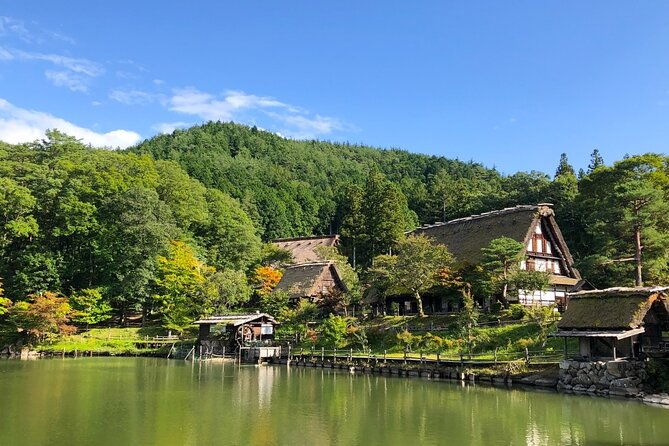
-
Hida Folk Village Museum in Takayama, Japan offers round-trip tickets starting from $10.00 per person, providing access to the open-air museum showcasing traditional Hida architecture and lifestyle.
-
The museum is wheelchair and stroller accessible, with transportation and surfaces designed for inclusive exploration of the cultural heritage.
-
Visitors can book "Reserve Now and Pay Later" passes, with a free cancellation policy up to 24 hours before the experience.
-
The museum features over 30 traditional buildings, including the 300-year-old Yabuhara Kura and Sakurayama Hachimangu Shrine, offering a glimpse into rural Hida life.
-
Passes are available through TREVOPEDIA, with a lowest price guarantee, ensuring confidence in the booking process.
Overview and Location
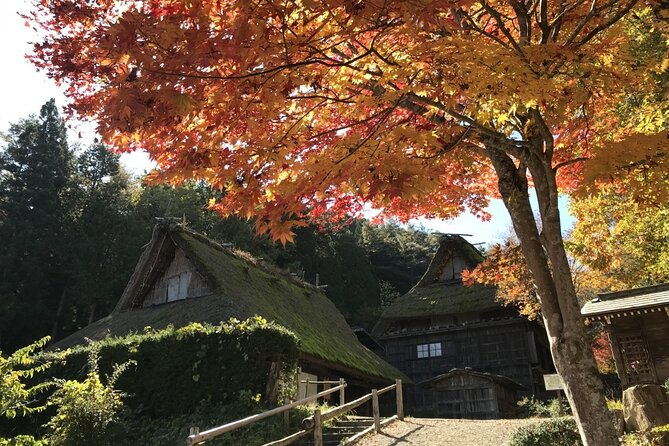
The Hida Folk Village Museum, known as Hida no Sato, is located in Takayama, Gifu Prefecture, Japan.
Situated just a short distance from the JR Takayama Station, the museum can be easily accessed from the Takayama Nohi Bus Center.
Visitors can purchase a round-trip ticket from the bus center to the museum, which includes admission.
The museum offers a glimpse into the traditional architecture and lifestyle of the Hida region, providing a unique cultural experience for travelers visiting Takayama.
Looking for more options in Takayama? We've reviewed plenty of other experiences.
Ticket Information
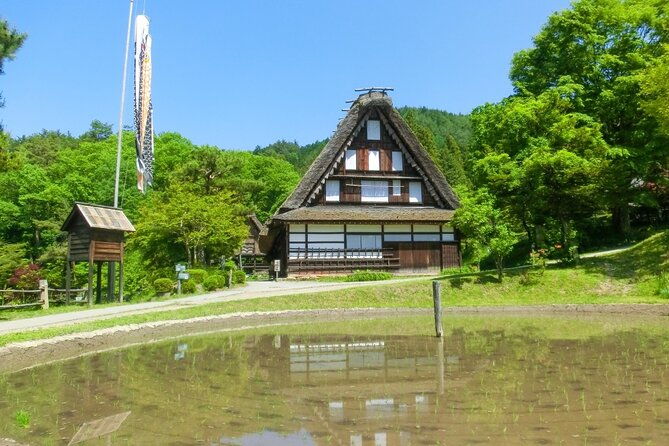
Visitors can purchase a round-trip ticket from the Takayama Nohi Bus Center to the Hida Folk Village Museum, which includes admission to the museum. The ticket costs from $10.00 per person.
Travelers can take advantage of the free cancellation policy up to 24 hours before the experience. The ticket is wheelchair and stroller accessible, and the transportation and surfaces are also wheelchair-friendly.
Visitors can reserve and pay later, and most travelers can participate. The museum opens at 10:00 am, and the passes are supplied by TREVOPEDIA with a lowest price guarantee.
Accessibility
The Hida Folk Village Museum is wheelchair and stroller accessible, ensuring a comfortable experience for all visitors. Transportation and surfaces within the museum are also wheelchair accessible, allowing seamless exploration of the traditional Japanese buildings and exhibits.
| Feature | Details |
|---|---|
| Wheelchair Accessible | Yes |
| Stroller Accessible | Yes |
| Near Public Transportation | Yes |
| Wheelchair Accessible Surfaces | Yes |
| Wheelchair Accessible Transportation | Yes |
The museum’s accessibility makes it an inclusive destination, catering to the needs of visitors with diverse mobility requirements. This commitment to accessibility enhances the overall experience and allows everyone to enjoy the rich cultural heritage of the Hida region.
Booking and Confirmation
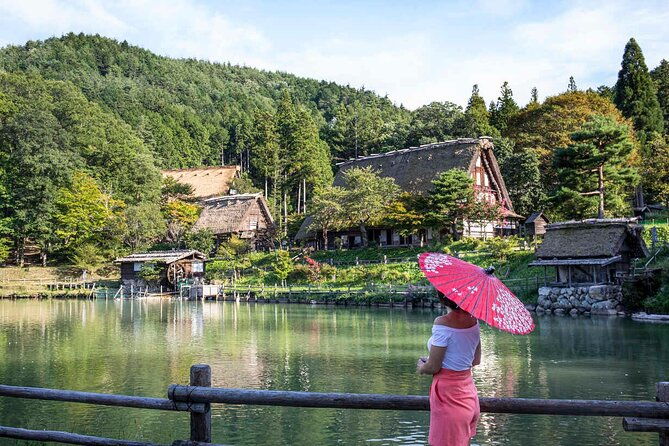
When booking the Hida Folk Village Museum experience, visitors receive a confirmation at the time of booking.
There’s also a "Reserve Now and Pay Later" option available, providing flexibility.
The Hida Folk Village Museum passes are suitable for most travelers, allowing them to conveniently explore the historic village.
Detailed booking information and availability for specific dates can be checked online, ensuring a seamless planning process.
The museum offers a Lowest Price Guarantee, giving visitors confidence in their purchase.
Getting There
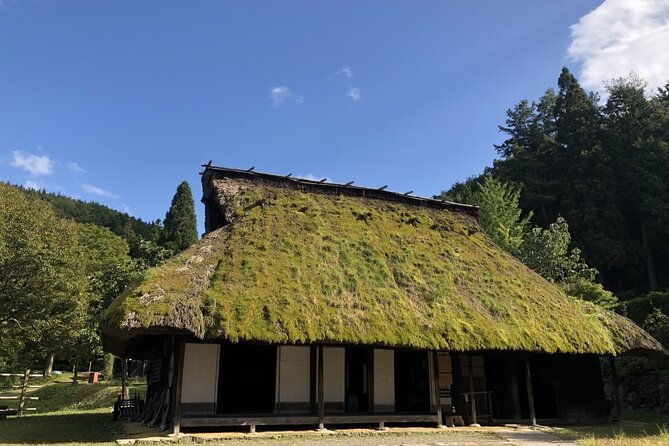
One can easily access the Hida Folk Village Museum in Takayama, Japan, from the Takayama Nohi Bus Center, which is adjacent to the JR Takayama Station.
The museum offers a convenient round-trip bus ticket, including admission:
- Board the bus at the Takayama Nohi Bus Center, just steps from the train station.
- Enjoy the scenic 15-minute ride to the museum’s entrance.
- Upon arrival, your admission ticket grants you access to explore the historic Hida Folk Village at your own pace.
The wheelchair-accessible transportation and surfaces make the museum accessible for all visitors.
- Hida Takayama, Shirakawa-Go+Observatory|Day Trip From Nagoya
- Nagoya: Hida Takayama & World Heritage Shirakawa-go Day Tour
- Nagoya: Hida Takayama and Shirakawa-go UNESCO Winter Trip
- Nagoya: Hida Takayama and Gassho-zukuri Village Day Tour
- From Nagoya: Gujo, Hida Takayama, and Shirakawa-go Day Tour
- Nagoya: Shirakawa-go, Gujo, Hida Takayama Historic Day Tour
Highlights of the Hida Folk Village Museum
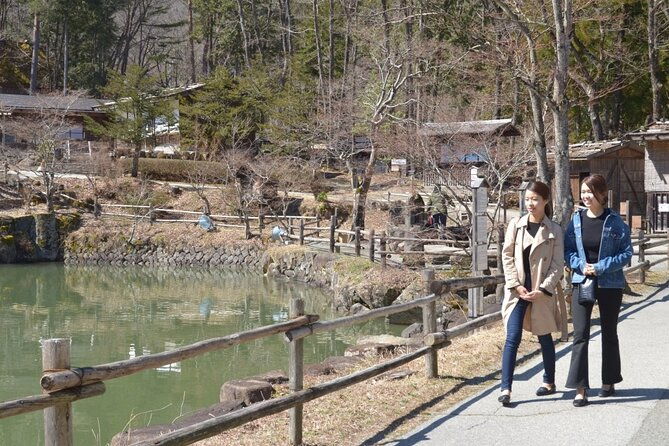
Stepping into the Hida Folk Village Museum, visitors discover a captivating journey through Japan’s rich cultural heritage. The museum features over 30 traditional buildings, including farmhouses, storehouses, and a candle workshop, offering a glimpse into rural life centuries ago.
Visitors can explore the intricate architecture, craftsmanship, and daily routines of the Hida region. Highlights include the striking Yabuhara Kura, a 300-year-old storehouse, and the Sakurayama Hachimangu Shrine, where visitors can learn about Shintoism.
The museum also hosts live demonstrations of traditional crafts, allowing guests to enjoy the region’s time-honored traditions.
Tips for Visiting the Hida Folk Village Museum
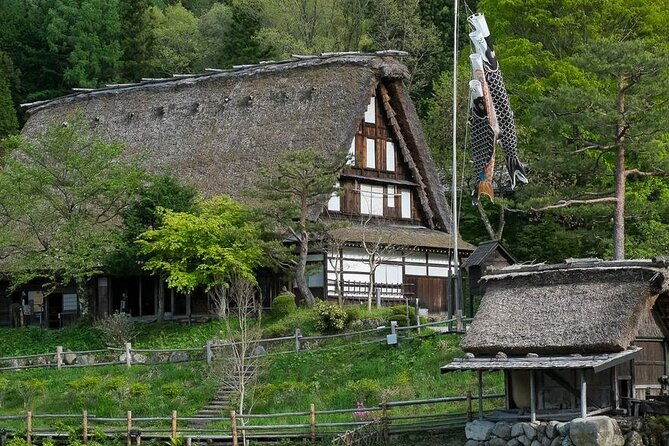
To make the most of a visit to the Hida Folk Village Museum, visitors should plan their time wisely. The 99-acre open-air museum showcases over 30 Edo-period farmhouses, so a strategic approach is key.
First, prioritize seeing the oldest and most unique structures. Second, explore the traditional crafts demonstrations to learn about the culture. Third, leave time to wander the scenic grounds and soak in the peaceful atmosphere.
With a bit of planning, visitors can discover the history and charm of this remarkable living museum.
Frequently Asked Questions
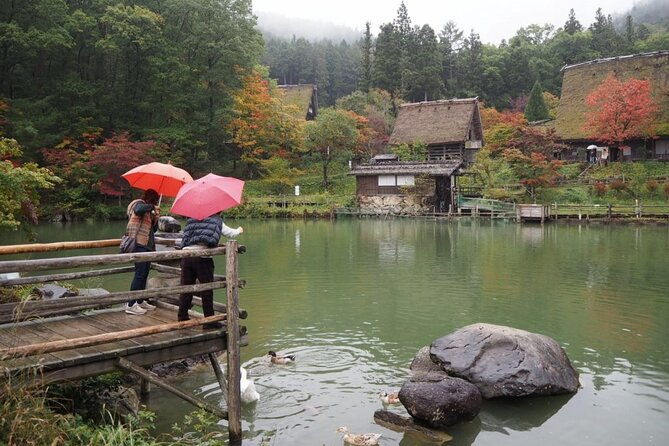
What Is the Duration of the Hida Folk Village Museum Visit?
The duration of the visit is not explicitly stated in the information provided. However, the schedule indicates a start time of 10:00 am, suggesting the visit likely lasts for several hours to allow for exploring the museum’s exhibits and facilities.
Can I Bring My Own Food and Drinks to the Museum?
Visitors can bring their own food and drinks to the museum. The museum does not have any restrictions on outside food and beverages, allowing visitors to enjoy their meal or snack while exploring the traditional folk village.
Are There Any Discounts Available for Students or Seniors?
Yes, the Hida Folk Village Museum offers discounted tickets for students and seniors. Adults pay from $10, while students and seniors receive a 20% discount, making their tickets around $8 per person. Visitors should present valid ID to receive the discounted rate.
Do the Museum Exhibits Have English Translations?
The museum exhibits have English translations available to help visitors understand the displays. This makes the Hida Folk Village Museum accessible and informative for English-speaking travelers.
Are There Any Restaurants or Cafes Within the Hida Folk Village Museum?
Yes, there are cafes and restaurants within the Hida Folk Village Museum. Visitors can enjoy local cuisine and refreshments at several dining options throughout the open-air museum site to enhance their cultural experience.
The Sum Up
The Hida Folk Village Museum in Takayama, Japan, offers a unique cultural experience. With its affordable round-trip ticket, accessible facilities, and flexible booking options, it’s an ideal destination for visitors. From exploring historic buildings to witnessing traditional craft demonstrations, the museum’s 99-acre open-air grounds provide an immersive journey into the region’s heritage. It’s a must-visit attraction for anyone seeking to discover the charm of traditional Japanese culture.
More Guided Tours in Takayama
- Osaka/Kyoto; Kyoto and Nara customizable Day Tour with Guide
- Takayama Early Morning Guided Walking Tour and Market Visit
- Takayama: Early Morning Guided Walking Tour & Market Visit
- Takayama: Zenkoji Temple Guided Meditation Experience
- Takayama Guided Sake Tasting Tour Visit Three Breweries
- Zenkoji Temple Entry Ticket and Guided Tour
More Tours in Takayama
- Osaka/Kyoto; Kyoto and Nara customizable Day Tour with Guide
- Osaka: 2-Day Hida Takayama, Shirakawa-go & Tateyama Tour
- Shirakawa go and Takayama 2 Day Tour from Tokyo
- Shirakawa-go, Hida Takayama Day and Old Town Tour from Nagoya
- Takayama Early Morning Guided Walking Tour and Market Visit
- Takayama: Funasaka Sake Brewery Tour and Tasting
More Tour Reviews in Takayama
- Osaka/Kyoto; Kyoto and Nara customizable Day Tour with Guide
- Osaka: 2-Day Hida Takayama, Shirakawa-go & Tateyama Tour
- Shirakawa go and Takayama 2 Day Tour from Tokyo
- Shirakawa-go, Hida Takayama Day and Old Town Tour from Nagoya
- Takayama Early Morning Guided Walking Tour and Market Visit
- Takayama: Funasaka Sake Brewery Tour and Tasting
Still browsing? Here are more Takayama experiences we've covered recently
- Shirakawago &Hida & Takayama SnowWall 2Days Tour from Nagoya
- Takayama: Morning Walking Tour with Café Break
- Osaka/Kyoto; Kyoto and Nara customizable Day Tour with Guide
- Osaka: 2-Day Hida Takayama, Shirakawa-go & Tateyama Tour
- Shirakawa go and Takayama 2 Day Tour from Tokyo
- Shirakawa-go, Hida Takayama Day and Old Town Tour from Nagoya
- Takayama Early Morning Guided Walking Tour and Market Visit
- Takayama: Funasaka Sake Brewery Tour and Tasting
- Snow Activities in Takayama Skiing / Snow bording / SnowShoeing / etc…
- Takayama: Early Morning Guided Walking Tour & Market Visit
- Takayama Explore Gokayama and Shirakawa go
- Takayama Mochi Making Experience in a Buddhist Temple
